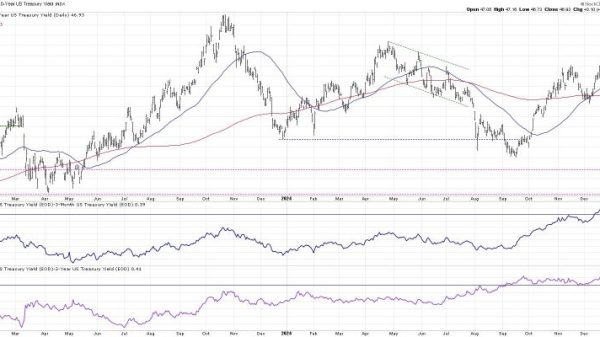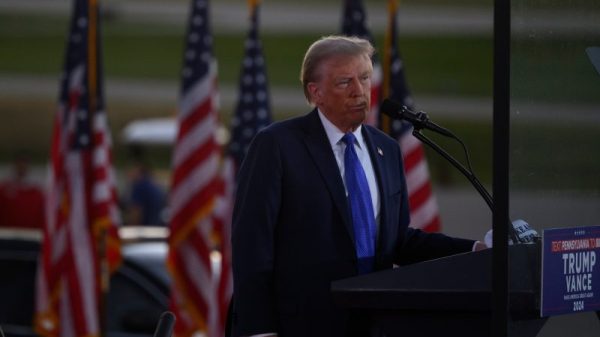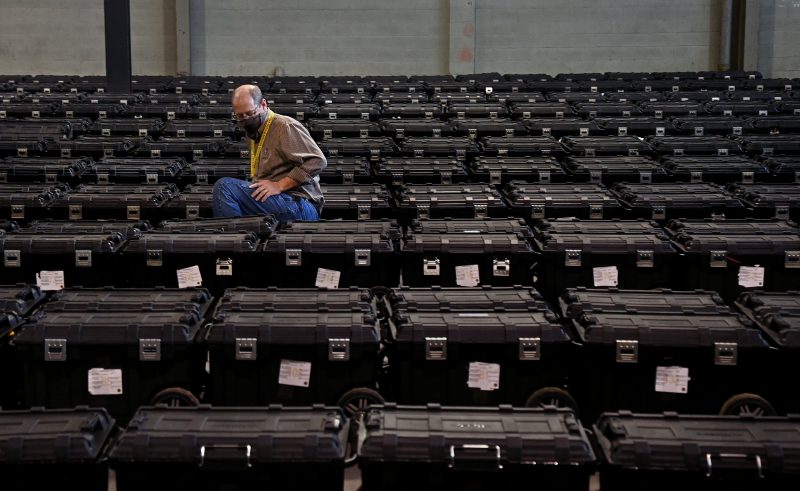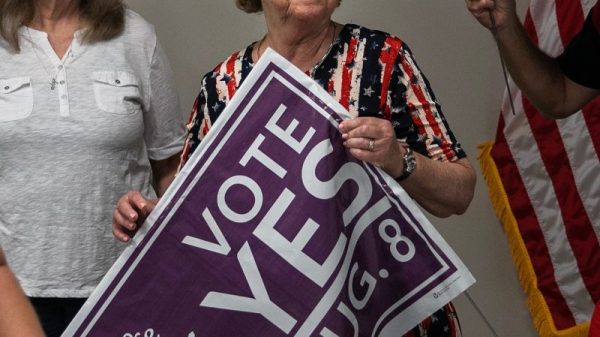When the polls closed on election night in 2020, President Donald Trump appeared to be winning Pennsylvania. But over the next several days, as officials counted mail-in ballots, his lead shrunk and then disappeared. By Saturday, Joe Biden was the clear winner of Pennsylvania — and, with it, the presidency.
The protracted counting process left a days-long vacuum that Trump filled with demands to stop counting the ballots while he was still ahead, declaring victory in Pennsylvania and building the false narrative that the mail-in votes were fraudulent. It became a core part of the false narrative that helped propel Trump’s “Stop the Steal” crusade and spurred election denialism among his allies and supporters that has continued to this day.
The delay was caused by a quirk of Pennsylvania’s election law, which forbids the opening of mail-in ballots until 7 a.m. on the day of the election. The narrow Election Day vote margins in 2020 coupled with the unprecedented number of people voting by mail because of the pandemic created a massive backlog and left election officials racing to finish the count. Pennsylvania, one of the most hotly contested battleground states, is one of only seven states, including another battleground, Wisconsin, that doesn’t allow pre-canvassing — the act of opening and processing mail ballots ahead of Election Day. In 2020, 27 states allowed pre-canvassing. Since then, 16 more states have passed laws permitting it.
But not Pennsylvania. Despite widespread calls for change, Pennsylvania is likely to again take several days to announce this year’s winner, alarming state election officials who worry the delay will cause confusion, deteriorate trust in the process and make election workers targets for harassment.
“If the electoral college comes down to Pennsylvania or Wisconsin, we might still face a long period where we don’t know the winner,” said Rachel Orey, an elections expert at the Bipartisan Policy Center.
Pennsylvania state lawmakers had four years to change the law and allow pre-canvassing, but the legislative session ended this month without them doing so. The Democratic-led Pennsylvania House of Representatives passed a bill in May that would have allowed county officials to begin pre-canvassing mail ballots seven days before Election Day, as was recommended by a bipartisan panel. But the Republican-controlled State Senate never brought it for a vote, with some Republicans arguing that the change wasn’t needed or that it should include other changes to election laws.
“It’s reprehensible that they didn’t get it done,” said Kathy Boockvar, a Democrat who was Pennsylvania’s secretary of state during the 2020 election. “This is not rocket science. The reality is that not passing this bill will mean that ballots will take longer to count, which means it will be longer until we have the results of the election.”
State Rep. Scott Conklin, a Democrat who sponsored the pre-canvassing bill, said that when he asked county commissioners across the state to name one wish for administering elections, the answer was resoundingly to allow them to start processing mail ballots early.
Conklin said refusal to do so could once again allow election deniers to baselessly claim that the mail ballots counted after Election Day are fraudulent. Ahead of the 2020 presidential election, Trump and his allies began to cast doubts on the integrity of mail ballots and urged his supporters to vote in person, creating what became known as the “red mirage.” Initially leading, Trump declared victory in Pennsylvania the day after the election, less than 24 hours after polls had closed. His campaign sued to stop the count even though nearly 1 million mail ballots statewide had not yet been tallied. Then–Trump attorney Rudy Giuliani and other Trump backers alleged widespread fraud in the mail ballots without evidence.
“This is a perfect case of where the elected officials are purposely causing a delay, causing an atmosphere of conspiracy and doing it on the backs of good citizens who trust them,” Conklin said, referring to the Republican legislators who blocked the legislation.
Seth Bluestein, a Republican city commissioner in Philadelphia, was a deputy commissioner during the prolonged vote count in 2020. He and his colleagues worked around-the-clock for days to process roughly 375,000 mail ballots in the city’s convention center as pro-Trump protesters raged outside. Bluestein and his colleagues said they received death threats. Near the site, police arrested two armed men who drove from Virginia, allegedly in search of fake ballots.
“That larger window of time when the final result is not known — that is where a lot of this harassment and threat environment can come about,” Bluestein said. “If we had pre-canvassing, it would really limit that window of opportunity for the spread of mis- and disinformation.”
Some Republicans refused to vote for the pre-canvassing bill because they said it didn’t include any of their election priorities, like stricter rules for the identification voters must provide. Others claimed that most counties have recently invested in automated machines to open the mail ballot envelopes, sufficiently speeding up the process.
“Pre-canvassing is a solution in search of a problem,” said state Rep. Brad Roae (R), who represents a deeply Republican area in the northwestern corner of the state. “If counties manually opened each envelope one by one with a letter opener like it was 100 years ago it would be an issue, but nobody does that.”
Senate Minority Leader Jay Costa (D) said he regrets not pushing harder for pre-canvassing immediately after the 2020 election. “We should have fixed it then,” he said.
Costa pointed to the work of a bipartisan panel created by the legislature in 2020 for the specific purpose of reviewing the state’s election system and recommending improvements. The panel described pre-canvassing as the “highest priority” for many of its members in its first report to lawmakers.
“The consensus,” the panel wrote in June 2021, “is that advance mail-in ballot processing could resolve many of the problems that contributed to concerns about the validity of votes in Pennsylvania.”
That year, state lawmakers passed a bipartisan bill that made significant changes to Pennsylvania election law, including allowing county officials to begin processing mail ballots five days before Election Day. But it contained other Republican-based priorities, including tighter rules for voter identification and limits to ballot drop boxes. Then-Gov. Tom Wolf (D) vetoed the legislation, saying it would create barriers to voting.
Even a few days of lead time to process mail ballots would help shield Philadelphia — and other parts of the state — against a potential repeat of 2020, Bluestein said. Without it, he said, election deniers will again have an opening to bully election officials and spread lies about the result before the race is called.
While election officials in Philadelphia say they are better prepared to handle the volume of mail ballots they are anticipating this year, they say it is still likely to take a day or more to get the results if the race is tight.
“Do you want the results on election night? Or do you want to wait a day or two?” said Lisa Deeley, a Democratic city commissioner in Philadelphia. “If you want to wait, then wait you will, because we can’t open those ballots until 7 a.m. on Election Day.”





























